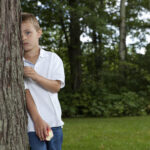Post-traumatic stress disorder (PTSD) is a psychological and physical condition that is caused by very frightening or distressing events. It occurs in up to 30% of people who experience traumatic events.
The negative effect of the climate crisis on the mental health of millions of people: projections in the region of South Florida

Dafni Katsampa, Francesca Bentivegna and Ivar Maas reflect on a recent study exploring the impact of extreme climate events on mental health of people located in South Florida, USA.
[read the full story...]








